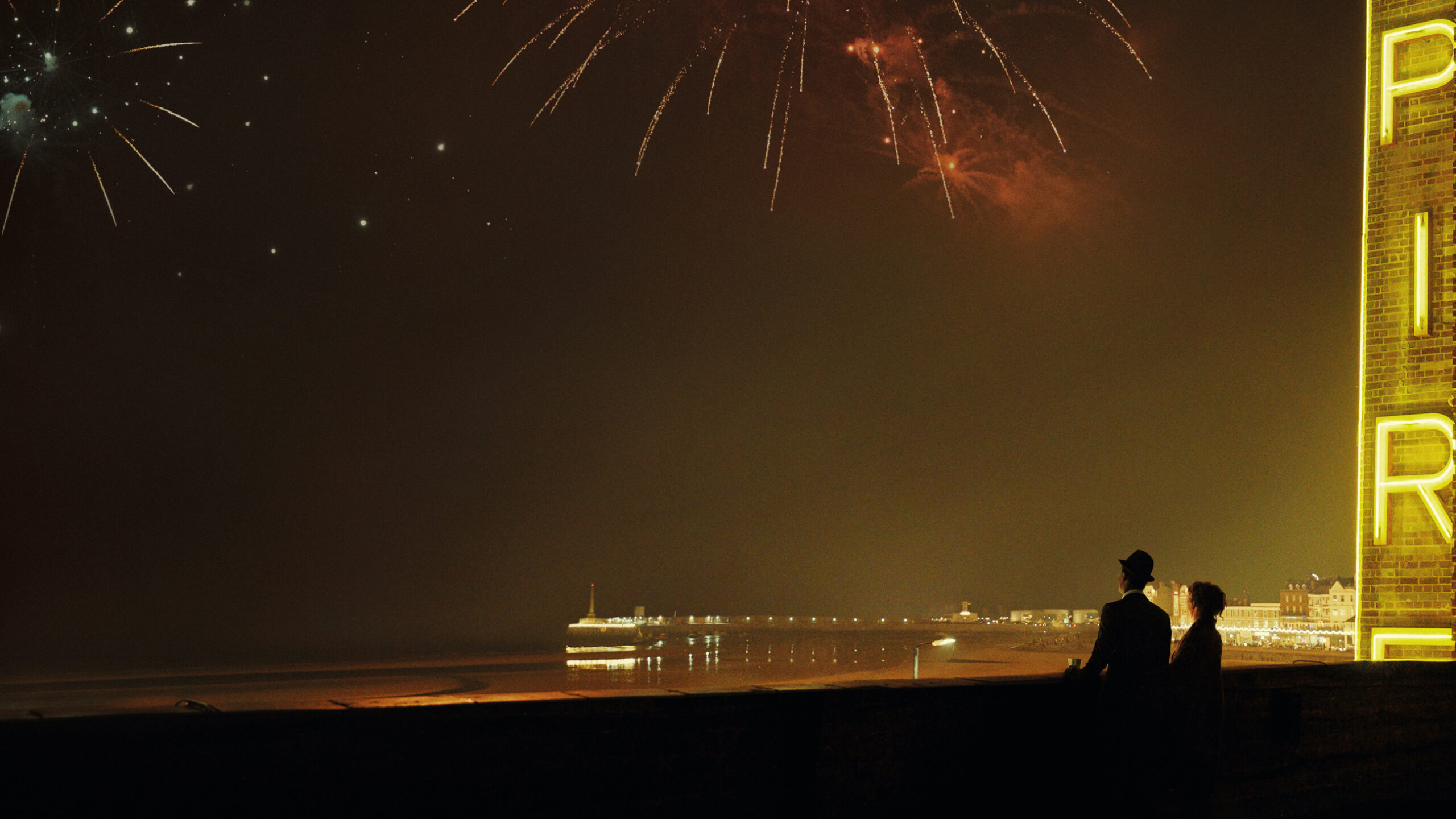About halfway through Sam Mendes’ latest film Empire of Light, I began to seriously question the nature of perspective in cinematic storytelling. Who’s point of view are we seeing these events from? How, when, or why should that point-of-view change? How closely can we follow one character and does that allow for subplots or cutaways from their main journey?
In Mendes’ filmography, we can see perspective being a guiding theme in a way. His first three works American Beauty, Road to Perdition and Jarhead are guided initially by narration from a protagonist, establishing the focus to be one of either recollection or omniscience, allowing for diversions as means of enhancing what is happening to this central character. Revolutionary Road and Away We Go are laser-focused on the narrative of two people as the either build their lives together or seek to unconsciously tear them apart. His two Bond films Skyfall and Spectre are as focused completely on James Bond in almost every frame as any other Bond film, but they still make efforts to cross-cut during climactic action or to establish new wrinkles in the plot. 1917 is the clearest attempt by Mendes to build a narrative completely around the journey of one person, only ever having the camera move away from Private Schofield to establish the intensity or calm of a sequence or location. Sam Mendes is an accomplished filmmaker, having crafted his skill for character work and how to involve an audience within a narrative from his acclaimed theatre productions first and with escalating levels of directorial ambition. Some of the films mentioned have become some of my all-time favourites.
I write all of this as preamble to say that I had no idea what the perspective in Empire of Light was supposed to be, and this annoyance infects the entire film. The story begins focusing on Olivia Colman as Hilary, a duty manager for an English coastal cinema during the early 1980s, who is emotionally drained by things we do not know, sexually exploited by her manager Mr. Ellis (Colin Firth), and finds little to no happiness in her life. When she meets new employee Stephen (Micheal Ward), the two kindle a kind of romantic connection rare for movies to explore, but issues of mental illness arise complicated with racial violence spreading through Great Britain at the time. Hilary suffers from what is most likely today categorised as being bipolar schizophrenic as she is prone to vicious mood swings and no awareness of her behaviours at times until people tell her, and at a certain point she is taken away to be committed.
When this does happen, we don’t then, by nature of following her character so closely for the first hour or so. We don’t continue on into a mental institution where she is taken and see her life in such a place, to understand what is happening to her and come to a resolution of her story with what has been established. Rather bafflingly, Mendes switches perspectives so rapidly to be now Stephen’s story that we are left wondering why we even focused on Hilary in the first place.
A perspective switch in a film can work, like the dramatic switch made in 2019’s Waves which comes at exactly the halfway mark to be a brand new film for the next hour. But that film was constructed to be two sides of one event, the build-up and the after-effect. Or consider the sprawling narrative threads of films like Short Cuts, Pulp Fiction, Magnolia or Contagion, where the focus is on a wide-swathe of different points of view of the same events or similar emotions, rarely if ever linking together.
In Empire of Light, it clearly sets Hilary on a path of self-discovery and resolution which we do see in the end, but the screenplay abandons her at a crucial moment in favour of pretending someone else was the main character all along. The film is not a two-hander, switching between Hilary and Stephen’s lives, nor is it an ensemble film about the many lives that go in and out of the fictional Empire cinema in 1981. It is an Olivia Colman movie with a supporting turn by Micheal Ward in a story that uses neither actor particularly well and confuses itself with well-meaning but ultimately misguided themes.
The crux of the narrative seems to be a comparison between two stigmas. One is mental illness in the 20th century that we see and feel with Hilary, someone who is simply given a boring job and lithium medication as a way to dull her senses rather than give her any real therapy,. The other is Stephen’s racist encounters with neo-Nazis appearing around the corner, threatening violence and eventually a racially-motivated fascist mob destroying the cinema and nearly killing Stephen. Both ideas are trying to interrogate issues that England faced in this time, but to put one and two together and attempt to say they are similar at all is fatal. They are both problems in society that have not been efficiently resolved even within Great Britain for hundreds of years, but they are not the same. If the film had focused on either one entirely, things might have been for the better. But even with Mendes’ credits as a filmmaker and stage director, he feels far too out of his depths with trying to speak about either issue, separately or combined.
Empire of Light on a technical level is rather impressive, as will happen when one employs Roger Deakins as cinematographer, production designer Mark Tildesley, and costume designer Alexandra Byrne, among many others in the set production and makeup teams. Using the currently active 100-year-old Dreamland Margate Cinema in Kent as a filming location certainly helps, the teams involved do a remarkable job in making things feel both dilapidated and nostalgic for those who remember great picture houses as their local cinema. There is a lost quality to the designs of these places, and Deakins employs his usual bag of tricks with lighting, lens choices, and unique framing to bring to a magical life this place that can evoke pure imagination. Lee Smith’s editing is rather functional, never all that apparent but the film does drag once Hilary’s breakdown is swept under the rug so to speak. Trent Reznor and Atticus Ross’ score (no Thomas Newman for Mendes this time around) is also functional but never all that exceptional.
One could respect some of the ambition on screen or marvel at the nostalgia found in such things like the design of the Empire cinema, the movies on display in the lobby or those they are projecting, the bafflingly cheap ticket prices, or the old-fashioned majesty found when handling and projecting 35mm film. But the movie itself already waxes poetically about these things ad nauseum. There could be an even better film in here beyond one trying to handle mental illness or racism, and that is one simply about cinemas themselves. Toby Jones’ projectionist character has a monologue about the illusion of frames and how movies are light amongst darkness which makes this writer think about a more contemplative, shorter-running, and more diverse film this could have been if it was about multiple characters and their connections with cinema. This is not that, and what Empire of Light is is Sam Mendes’ first failure as a director, in my opinion. It is not an awful film nor one of the worst of 2022, but it never comes together correctly or efficiently and leaves one annoyed and confused.
Director & writer: Sam Mendes
Starring: Olivia Colman, Micheal Ward, Toby Jones, Colin Firth



